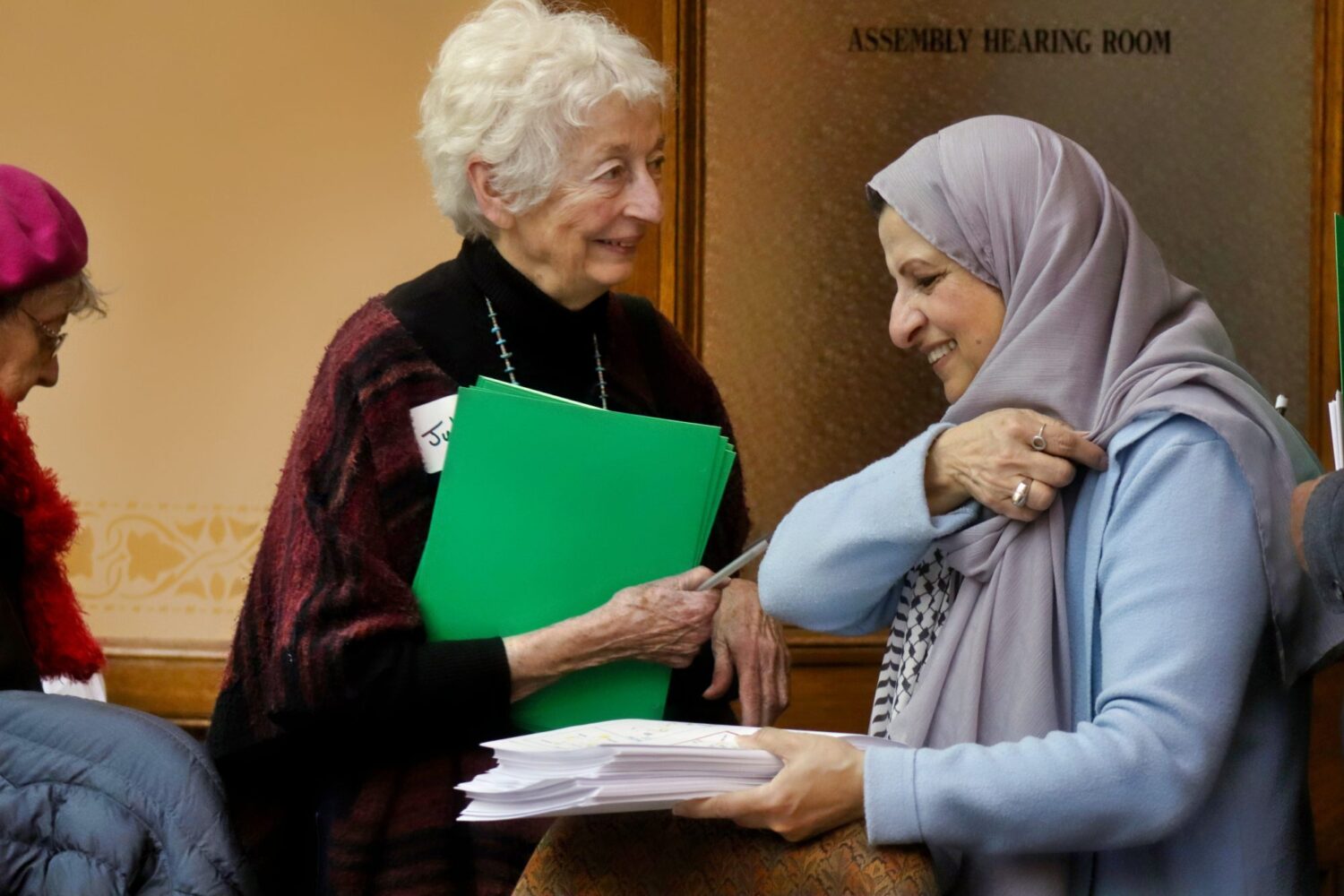
About 100 advocates filled the State Capitol’s halls with green folders in hand as Wisconsinites from across the state tried to lobby for repeal of a 2018 law prohibiting companies with state contracts from boycotting Israel.
Wisconsin Coalition for Justice in Palestine (WCJP) and Wisconsin Right to Boycott (WRB) organized a statewide effort to call on elected officials to repeal Assembly Bill 553. The act, which codified a 2017 executive order from former Governor Scott Walker, prohibits state contracts and allows the termination of contracts with businesses that boycott Israel. Organizers and de facto citizen lobbyists claim the effort is a push to a “full restoration of our First Amendment rights.”
“More than 30 states have this particular law and it’s identical,” drafted by the conservative American Legislative Exchange Council, said Janan Najeeb, president of the Milwaukee Muslim Women Coalition. “It specifically requires allegiance to Israel by prohibiting any contract over $100,000 with the state” for any business that boycotts Israel.
The anti-boycott law is present in 38 states. It’s a seemingly copy and paste style bill pushed by the American Legislative Exchange Council (ALEC) to combat the Boycott, Divestment, Sanction (BDS) movement.
Najeeb said the law overreaches, applying to businesses that have no international business and would not interact with Israel in any way, such as domestic violence and daycare facilities. Even if its owner has a personal BDS stance and pushes the stance into the business — regardless of lack of Israel interaction — it cannot gain a contract with the state, Najeeb said.
“There’s a lot of countries that we could potentially boycott. I think it’s unjust and so many Wisconsinites do,” Najeeb said.
Attendees of the boycott lobby gathered in the Northwest 328 room in the State Capitol as they organized their plan. Folders were prepped with reading materials on the bill along with a list of elected officials to visit for their lobbying efforts.
Materials included a letter from a rabbi with Shaarei Shamayim, a Madison based Jewish community group; information on what the act is and its history in the state and across the country; talking points for lobbyists; and a call for action titled “Protect Freedom of Speech: Restore Wisconsin’s Right to Boycott.”
Madison365 tagged along with one group of citizen lobbyists — Reema, Carson, Stephanie and Bonnie Block — that visited the offices Rep. William Penterman, R-38, and Assembly Speaker Robin Vos.
Neither Representative was present so the lobbyists spoke with staff instead. Staff were unaware of the law, its origins and the sweeping effects it has on businesses.
“You’re probably familiar with South Africa and how it brought out change, that’s what we want,” Block said to Mac Feehan, research assistant for Rep. Vos. “We don’t think anyone should be prevented from speaking up.”
The general consensus from citizen advocates talking to elected officials and their staff found that not many in office knew or understood the anti-boycott bill.
Organizers held a press conference after lobbying efforts to broadcast their message out to attendees for the lobby efforts and elected officials invited to attend.
“I’ve been against this law, the stifling of free speech, especially as it relates to criticism of Israel, since it was introduced in 2018,” said Sandy Pasch, former State Representative and President of Jewish Voice for Peace-Milwaukee. “Stifling the use of these nonviolent tools to hold governments and corporations accountable is bad for all of us. It makes all of us less free and it paves way for the rising authoritarianism that we are seeing today.”
Pashc pointed out that the day following the lobbying efforts is Madison’s Holocaust Remembrance Day. She notes the stark parallels between Israel’s treatment of Palestinians and the Holocaust.
Organizers and citizen lobbyists met at Grace Episcopal Church across from the State Capitol for an after action meeting.



